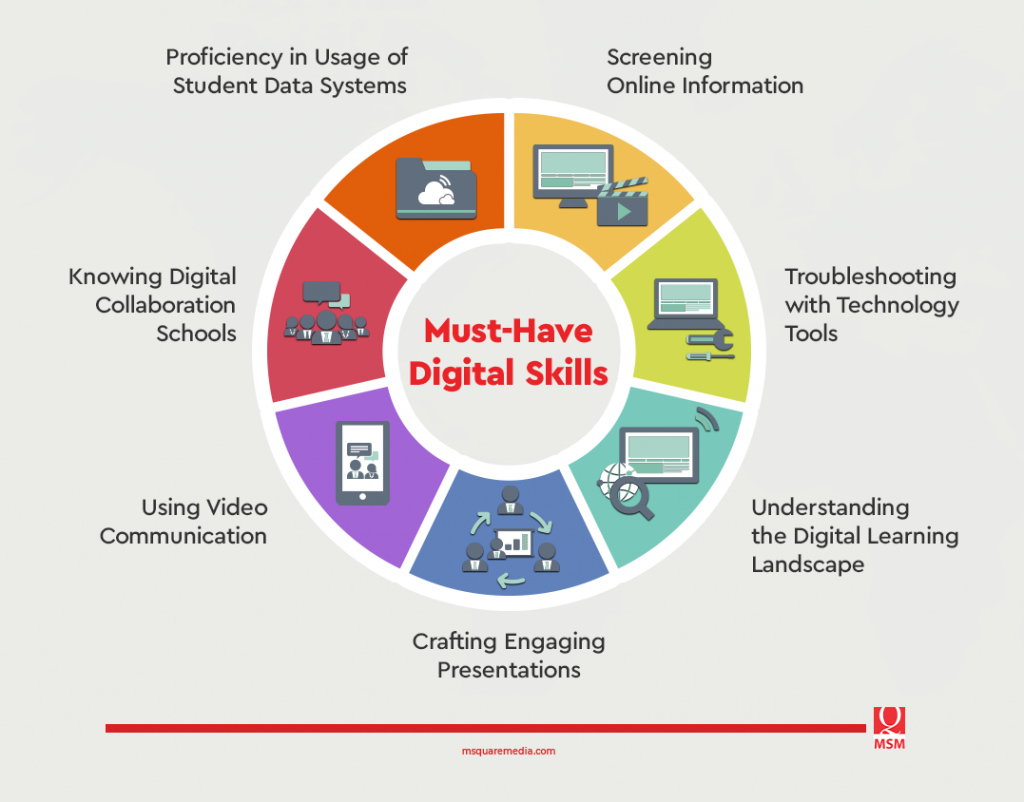In this era where everything seems to be technology-driven, there is great value, if not an immediate need, for educators and education managers to use more digital tools in the classroom.
While they don’t have to learn HTML coding or advanced content management systems, school leaders are recommended to maintain a good level of digital know-how. Education technology is now moving at lightning speed, and educators need to maintain their professionalism and credibility in the online learning landscape.

Here are some digital skills that would be useful:
1. Proficiency in Using Student Data Systems
Since most schools are transitioning data into digital systems, educators are recommended to learn how to access and use these data platforms, as well as to go beyond access and become well-versed in navigating the systems’ different areas. Not only will this save them time when they need to pull student records from learning management systems, but it will also help them ensure that every student’s information is kept private and secure.
A report from the K-12 Cybersecurity Resource Centre showed that in the United States, a total of 348 cybersecurity events occurred in 2019, almost triple the amount from 2018. Data breaches can be particularly costly; according to research from the Ponemon Institute, one education breach can cost up to $260 on average.
2. Screening Online Information
In the goal of educating, some educators may unwittingly spread unverified and unreliable information. Institutions should actively train teachers in critically assessing the veracity of online data, helping develop individual ability to evaluate information based on its level of reliability, accuracy, and bias.
Today, fake news proliferates faster than credible news. In a review done from 2006 to 2017, as many as 126,000 rumors were spread by close to 3 million people on Twitter.
Similarly, a 2016 BuzzFeed News analysis showed that 20 viral fake news stories about the U.S. elections garnered more engagement on Facebook than real, credible news.
With students relying on their school leaders for information, educators and education managers should be careful not to become the very purveyor of false information. Learning how to filter data is critical for maintaining credibility.
3. Troubleshooting with Technology Tools
With digital learning, teachers are expected to address and resolve issues. Let’s take a look at the present situation.
Teaching from home means having limited access to the school’s IT department. So when tech trouble comes, teachers rely on themselves for remedies to tech-related glitches and to ensure they do not lose their students’ attention.
As students’ learning shifts toward digital education, educators should also find ways to keep their students engaged, particularly now that students tend to multitask and get distracted more during online courses.
While it may take time for them to address a technological issue, educators should be empowered to come up with a practical solution or a backup plan that would ensure continuity in lessons. Official handbooks or practical manuals for tech troubleshooting should be within their reach.
4. Understanding the Digital Learning Landscape
There’s a world of difference between teaching face-to-face and providing online instruction. Capably navigating the online landscape can equip educators with a better understanding of students and their learning process across various mediums, and therefore employ appropriate teaching styles. Often, this requires crafting a digital instructional curriculum suited for online delivery.
5. Crafting Engaging Presentations
Condensing topics into presentations is common in virtual classrooms. But if teachers simply read their text-filled slides during synchronous learning sessions, they would quickly lose engagement with students.
It is essential for educators to learn how to create and deliver catchy presentations to be delivered online.
6. Using Video Communications
At the height of the COVID-19 pandemic in 2020, many institutions shifted to online learning using video. With online teaching likely to remain a mainstay in one form or another, learning how to navigate different video communication platforms should be high on the priority list.
Instructors, however, should also be cognizant of the security risks associated with using online conference platforms. With the increased use of video communications comes an increase in hacking attempts, preying on vulnerable groups. Educators should be proactive about how they can prevent attacks to protect their students, data, and knowledge base.
7. Knowing Digital Collaboration Tools
In addition to using video conferencing, educators can also benefit from using online collaboration tools to streamline project organization and completion. Project management tools, document-sharing applications, cloud storage, and email management software are just some of these tools.

SUNEETHA QURESHI
MSM President - Global
Suneetha has more than 10 years of experience in the international education sector. As president of MSM, she fortifies its business development outreach globally, particularly in the face of MSM’s foray into edtech-based recruitment via MSM Unify. She preserves the premium, value-adding services provided to each MSM partner institution, including dedicated teams on the ground, agent management, lead generation and inquiry management, application pre-screening, and student and parent support through pioneering pre-departure briefing sessions.
She has an impeccable track record of successfully launching the representative offices in Asia and Africa of many North American and European higher education institutions. Her key strengths include hiring, training, and developing teams as evidenced by the successful results of the dedicated in-country college and university client teams.
Suneetha also has taken the lead in developing several initiatives at MSM, including building robust standard operating procedures, the Rise ‘n Shine team engagement platform, and the organization’s data analytics and audit segments.

